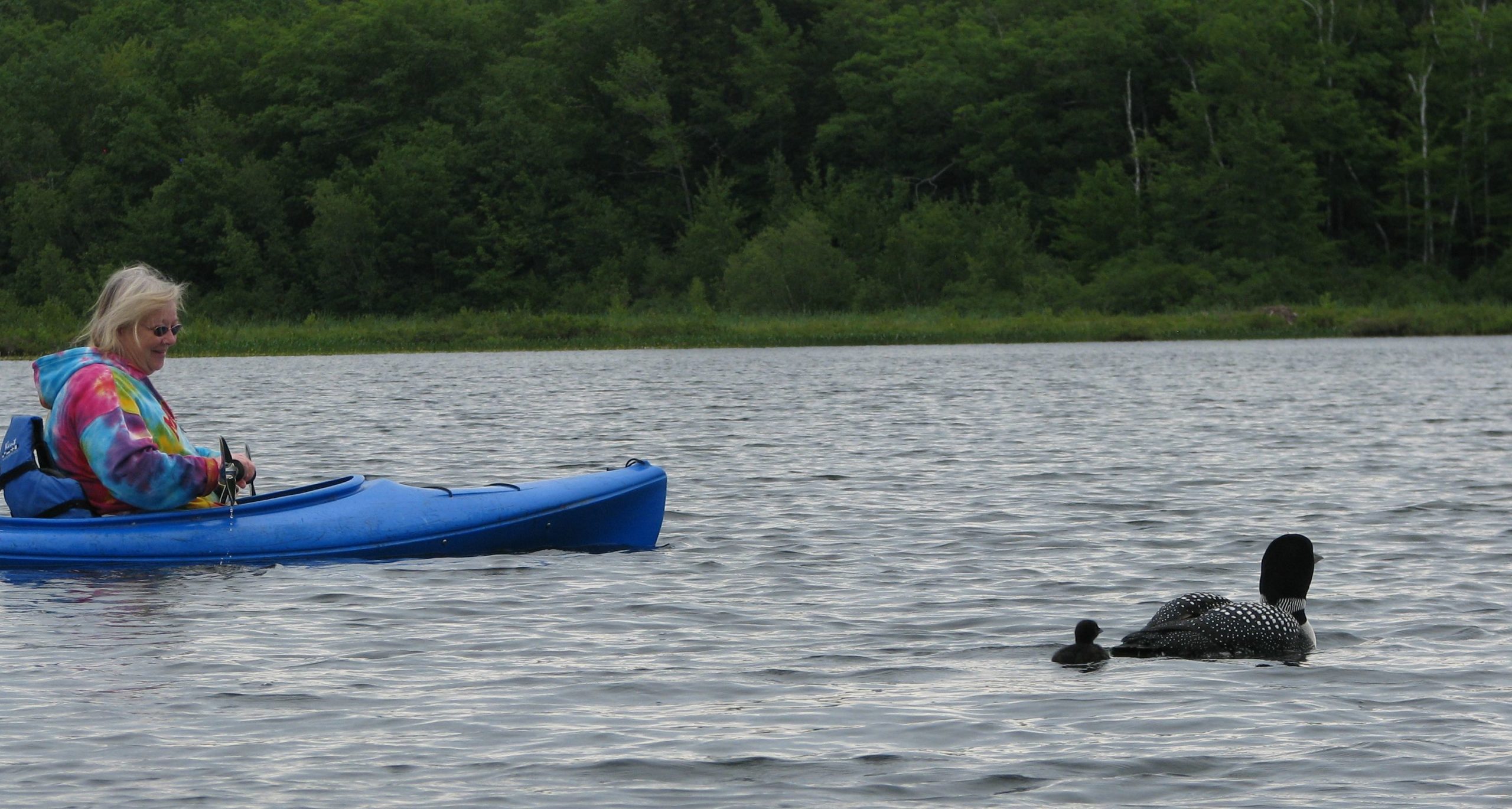** IMPORTANT CORRECTIVE TO THIS STORY FOLLOWS ** See warning note below from a Maine wildlife biologist and a link to loon.org :
Summer on McGrath Pond…a time when we all anxiously await the arrival of baby loons, checking to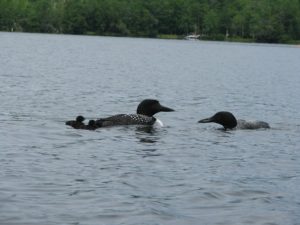 see if mom is still sitting on the nest and hoping we are lucky enough to watch the antics of twins. The waiting game ends on July 8th for the 2021 season with the arrival of twins. Yahoo!
see if mom is still sitting on the nest and hoping we are lucky enough to watch the antics of twins. The waiting game ends on July 8th for the 2021 season with the arrival of twins. Yahoo!
I kayak over and am so happy to spot both parents feeding two babies. I cannot wait to share the news that we have twins with neighbor Donna V. Donna anxiously joins me in her kayak and we head back over to the island. We cautiously go around the island, but no loons. Donna spots them way off in front of Pleasant Point. When we get close enough to them, we spot only one baby. What? Now I’m trying to convince Donna that I saw two. “Trust me, Donna, I’ve got two babies in my photos.” We decide to go back and check the island. As we get 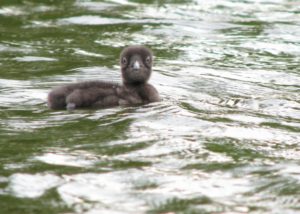 closer, we spot a tiny black object bobbing around in the water. Could it be the missing baby? OMG it is! Poor baby has been left alone and is crying. Talk about tugging at our heart strings.
closer, we spot a tiny black object bobbing around in the water. Could it be the missing baby? OMG it is! Poor baby has been left alone and is crying. Talk about tugging at our heart strings.
We start to coax the baby back to the island but then change plans. “Hey, Donna, let’s try to guide him back to his parents,” I say. As we start to do this, Donna puts her kayak paddle in the water and the little guy hops up on it. Now what to do? Donna can’t move. Being ingenious, Donna pulls a baby blue micro cloth out of her kayak, puts it on the bow, and the little guy hops aboard. 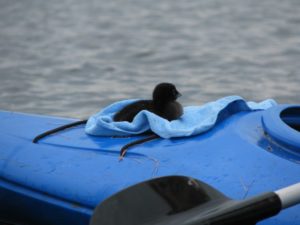
Both of our hearts are racing with excitement and awe. We now need to safely get the baby back to his family. As we approach the family, one of the parents comes towards us calling the baby. The baby responds by leaving the comfy micro cloth nest and joins the parent.
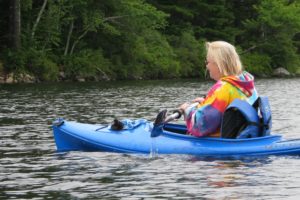 Donna and I are both elated and shaking from our adventure of reuniting a family. We will never forget this day and wanted to share our story. Fingers crossed we get to enjoy a loon family of four this summer of 2021!
Donna and I are both elated and shaking from our adventure of reuniting a family. We will never forget this day and wanted to share our story. Fingers crossed we get to enjoy a loon family of four this summer of 2021!
by Heather M.
MPSLA has added this note to the story above at the request of a member, who brought it to the attention of an experienced Maine wildlife biologist quite knowledgeable about loons. This is the wildlife biologist’s Corrective Response:
After reviewing a recent post about one person’s “rescue” of a loon chick on McGrath Pond, we reached out to an experienced Maine wildlife biologist for a professional take on loon rescues by local residents. Here’s the response we received:
“No matter what the circumstance, the public should not attempt to rescue loons or their chicks on their own. If a loon seems to be in trouble, please call the Maine Warden Service at 207-287-8000 or contact other organizations that work with loons for help and guidance, such as Avian Haven, Maine Audubon, and the Biodiversity Research Institute.
Loons are protected by state and federal laws, and approaching, handling, and pursuing loons is prohibited. There are good reasons for these laws, and many reasons why it’s best not to interfere.
No doubt, people love loons and want to help if they think a loon is in trouble or if they see parents and young separated. But what seems like help could actually be putting the loons or their chicks in harm’s way.
As one example, there is a behavior called “chick stashing,” where parents will stash their chicks somewhere if there is a threat nearby. If the adults aren’t injured or killed while defending their family, they will return for the chick once they have fended off the threat. So, intervening during chick stashing and reuniting the chick with its parents before the parent returns for it can actually put the chick in harm’s way–or put the parents in a position where they have to be watching and protecting the chick while also trying to address an intrusion or a predator. Yes, the chick can be vulnerable when it’s stashed away, but it is often safer than if it were a part of a dispute or a predatory attack. So, a lone chick may not actually be in need of our help or protection, and lending a hand to reunite the family can introduce stress or have more dire consequences.
If parents and chicks are separated, they use vocalizations to locate each other. The “cries” that some people say compel them to want to help a loon may actually be a chick or a parent’s way of calling out and finding a family member. And vocalizations can also be signs of distress, possibly caused by your presence or approach. What you interpret to be a cry for help may actually be a warning to stay away. Your attempts to help can interfere as loons attempt to reunite.
Rescues can also be dangerous. Common loons are very large, strong birds with sharp bills. During the breeding season, loon parents defend their territories and their families from predators and other loons in sometimes bloody or even fatal clashes. One loon in Maine has been documented to have killed a bald eagle by impaling it with its bill. Professionals who work with loons receive training on how to handle loons and hold a healthy respect for the damage the loons can inflict while defending themselves. Loons may be beautiful and endearing with their parental care and mournful calls, but they are powerful and can be aggressive.
Note also that avian flu is on the rise and the virus can be carried on hands, clothing, or surfaces and persist for a long period outside of a host. Outsiders could transmit this flu to the loons rather than help them.
For these reasons and others, please do not handle loon chicks or attempt to “rescue” a loon. What sounds like a heroic or heart-warming tale may in reality be unnecessary or misguided interference, with potential dangers for the loons or the rescuer. Handling, pursuing, or interfering with loons is not permissible by law, no matter how well intention-ed. Often the best support you can give loons is to give them space and minimize disturbance by keeping your distance and watching from afar with binoculars. If you believe a loon is in trouble, please call for help.”
More Loon information is available at the “You can help Loons page at loon.org/you-can-help-loons-2/
